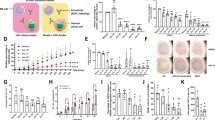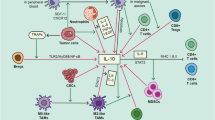Abstract
Although OK-432, a potent BRM, has been known to induce the remarkable improvement of clinical conditions in cancer patients through its strong effects on their immune capabilities, no specific immune parameters have been identified to best predict the clinical outcome after the OK-432 treatment. In an attempt to identify early parameters indicative of the clinical effects, we have administered 0.1 mg of OK-432 intraperitoneally to a total of 12 patients with malignant ascites and examined peritoneal fluid and peripheral blood obtained on 4 days before, 1, 3, and 7 days after the OK-432 injection using various immunobiological assays. Four weeks later, clinical improvements were evaluated by the disappearance of malignant cells from and/or substantial decrease in ascites. Four patients (responders) showed the improvements while 8 patients (nonresponders) showed no clinical evidence for improvement. In a few parameters among the many examined, significantly different patterns of changes were noted between responders and nonresponders. Thus, in nonresponder patients MØ and T cell population returned to an initial low level after early increases (on days 1 and/or 3), while they remained increased day 1 through 7 in responders. In responder patients, the cytotoxicity of peritoneal mononuclear cells against K562 and Daudi cells were augmented on day 7, but not in nonresponder patients. Thein vitro stimulation of the mononuclear cells with OK-432 enhanced the cytotoxic activity and induced the interferon (IFN) production in the responders but not in nonresponders. These parameters will be useful for the early prediction of the expected clinical effects of OK-432.
Similar content being viewed by others
Abbreviations
- BRM:
-
biological response modifier
- FBS:
-
fetal bovine serum
- IAP:
-
immunosuppressive acidic protein
- IFN:
-
interferon
- MØ:
-
macrophage
- PMN:
-
polymorphonuclear leukocyte
- PS:
-
performance status
References
Kimura I, Ohnishi T, Yasuhara S, Sugiyama M, Urabe Y, Fujii M, Machida K. Immunochemotherapy in human lung cancer using the streptococcal agent OK-432. Cancer 1976; 37: 2201–3.
Uchida A, Hoshino T. Clinical studies on cell-mediated immunity in patients with malignant disease. Effects of immunotherapy with OK-432 on lymphocyte subpopulation and phytomitogen responsivenessin vitro. Cancer (Phila.) 1980; 45: 476–83.
Watanabe Y, Iwa T. Clinical value of immunotherapy for lung cancer by the streptococcal preparation, OK-432. Cancer 1984; 53: 248–53.
Torisu M, Katano M, Kimura Y, Itoh H, Takesue M. New approach to management of malignant ascites with a streptococcal preparation, OK-432. I. Improvement host immunity and prolongation of survival. Surgery (St. Louis) 1983; 93: 357–64.
Uchida A, Micksche M. Intrapleural administration of OK-432 in cancer patients: Activation of NK cells and reduction of suppressor cells. Int J Cancer 1983; 31: 1–5.
Ono T, Kurata S, Wakabayashi K, Sugawara Y, Saito M, Ogawa H. Inhibitory effect of a streptococcal preparation (OK-432) on the nucleic acid synthesis in tumor cellsin vitro. Gann 1973; 64: 59–69.
Talmadge IE, Herberman RB. Evaluation of immunomodulatory and therapeutic properties of biological response modifiers. Cancer Treat Rep 1986; 70: 171–82.
Uchida A, Micksche M. Lysis of fresh tumor cells by autologous peripheral blood and pleural effusion lymphocytes activated by OK-432. J Natl Cancer Inst 1983; 673–83.
Saito M, Nanjo M, Aonuma E, Noda T, Nakadate I, Ebina T, Ishida N. Activated macrophage sera responsible for the tumor-inhibitory effect in mice receiving intravenous injection of OK-432. Int J Cancer 1984; 33: 271–6.
Watabe S, Sendo F, Kimura S, Arai S. Activation of cytotoxic polymorphonuclear leukocytes byin vivo administration of a streptococcal preparation, OK-432. J Natl Cancer Inst 1984; 72: 1365–70.
Hojo H, Hashimoto Y. Cytotoxic cells induced in tumorbearing rats by a streptococcal preparation (OK-432). Gann1981; 72: 692–9.
Saito M, Ichimura O, Kataoka M, Moriya Y, Ueno K, Sugawara Y, Nanjo M, Ishida N. Pronounced antitumor effect of LAK-like cells induced in the peritoneal cavity of mice after intraperitoneal injection of OK-432, a killed streptococcal preparation. Cancer Immunol Immunother 1986; 22: 161–8.
Saito M, Nanjo M, Katoaka M, Moriya Y, Sugawara Y, Yoshida T, Ishida N. Adoptive immunotherapy by pantropic killer cells recovered from OK-432-injected tumor sites in mice. Cancer Res 1988; 48: 4163–7.
Papanicolaou GN. Atlas of exfoliative cytology. Harvard Univ Press. Cambridge Mass 1963; 13–21.
Miller AB, Hoogstraten B, Staguet M, Winkler A. Reporting results of cancer treatment. Cancer 1981; 47: 207–14.
Katano M, Yamamoto Y, Mizoguchi T, Hisatsugu T. Induction of tumor growth inhibitory factor (TGIF) in human mononuclear cells by OK-432, a streptococcal preparation. Cancer Immunol 1988; 27: 198–204.
Abo T, Sugawara S, Amenomori A, Rob H, Rikiishi H, Moro I, Kumagai K. Selective phagocytosis of gram positive bacteria and interleukin 1-like factor production by a subpopulation of large granular lymphocytes. J Immunol 1986; 136: 3189–97.
Tamura S, Nishigaki T, Moriwaki Y, Fujioka H, Nakano T, Fujii J, Yamamoto T, Nabeshima K, Hada T, Higashino K. Tumor markers in pleural effusion diagnosis. Cancer 1988; 61: 298–302.
Lichtenstein A. Antitumor effect of the streptococcal preparation OK-432 in a murine model of ovarian cancer. Cancer Immunol Immunother 1988; 24: 172–7.
Werner-Wasik M, Muenchhausen W, Nolan JP, Cohen SA. Endogeneous interferonα/β produced by murine kupffer cells augments liver-associated natural killing activity. Cancer Immunol Immunother 1989; 28: 107–15.
Shibata Y, Tamura K, Ishida N. Cultured human monocytes, granulocytes and monoblastoid cell line (THP-1) synthesize and secrete immuno-suppressive acidic protein (a type ofα 1-acid glycoprotein). Microbiol Immunol 1984; 28: 99–111.
Shibata Y, Tamura K, Ishida N.In vivo analysis of the suppressive effects of immunosuppressive acidic protein, a type ofα 1-acid glycoprotein in connection with its high level in tumor-bearing mice. Cancer Res 1983; 43: 2889–96.
Author information
Authors and Affiliations
Rights and permissions
About this article
Cite this article
Kataoka, M., Hashimoto, S., Nanjo, M. et al. Search for immunobiological parameters predictive of clinical effects of OK-432 in patients with malignant ascites. Biotherapy 3, 193–201 (1991). https://doi.org/10.1007/BF02171682
Received:
Accepted:
Issue Date:
DOI: https://doi.org/10.1007/BF02171682




